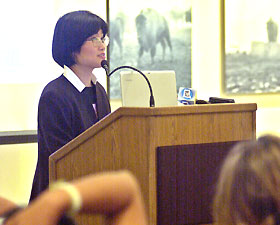For more archives, go to the Advance Archive/Search Page.
Speaker Discusses Role
Of Asian-American Voters
The minority vote will be important this year because the election is going to be so close, according to Pei-Te Lien, a professor of political science at the University of Utah and author of several books about Asian-American politics.
 |
|
Professor Pei-te Lien of the University of Utah gives the
keynote address at the Asian-American Heritage Month opening
event at the Benton Museum. |
She says Asian-Americans need to band together and vote as a group in order to be a powerful voice.
Lien outlined key points from her latest book, The Politics of Asian Americans: Diversity and Community, during the opening ceremony for Asian-American Heritage Observance Month on Sept. 30. The event was sponsored by the Asian-American Cultural Center and the Asian-American Studies Institute.
Voter turnout will be critical, Lien said, noting that U.S.-born citizens have a higher voter turnout than foreign-born citizens, and Asians have the lowest turnout of all minorities.
“Your vote weighs more in an election this close,” she said. “If the 2004 presidential election is as competitive as it was in 2000 – which is very, very likely – even a small ethnic minority, like Asians, can change the national outcome of the election.”
If Asian-Americans understood the stakes, they would be more willing to take part in the election, she said. It is not just the president that the people elect, she said. Through that president they are electing senators, representatives, and judges.
The impact of Asian voters would be greater if they voted in a bloc, Lien said, but that is not “the natural order of things.” Because Asian culture is so widespread, its many sub-groups are often at odds. Vietnamese people are traditionally more conservative, for example, the Chinese are more liberal, she said.
“It would be better if Asian-Americans could band together,” she said, “but I don’t think you can order them to band together, and you really cannot anticipate that they would naturally come together.”
Fifty percent of Asian citizens do not identify with a party, leaving the group politically fragmented, she said. Asian-Americans are the genuine swing vote, she explained, with views in between those of other minorities and white voters.
Lien said the Asian minority is in a catch-22. Because Asian-Americans are reluctant to show partisanship, they are largely ignored by both parties, she said. And because they are largely ignored by both parties, they do not feel they belong to either party.
“The lack of party affiliation among individual Asian-Americans certainly is a weak point,” she said.
“Participation actually helps generate identity,” she added.
Asian-Americans are not targeted in campaigns because only 25 percent of the population votes, Lien said, and they are responsible for only 7 percent of the national vote.
Asian-Americans also vote on issues rather than along party lines, making it less efficient for any party to spend money on this minority, she said. As a result, they are less likely to receive mail or phone calls from either party.
Although the Democratic Party is known as the party of minorities, recently they have shied away from minority voters so as not to lose support from white voters, Lien said.
She said much of the progress made in the growing importance of minorities not only in elections but to politicians and political parties during the past 10 years has been halted since 9/11. The minority population is now in “the process of recovery” from renewed discrimination, she said.
The Asian minority is often ignored because it is not seen as oppressed in American society, Lien said. Yet racial discrimination is the most important issue for Asian-Americans.
Quoting data collected for her most recent book, she said that although 60 percent of Asian-Americans would like to see an Asian candidate in office, only 25 percent would vote for ethnic candidates if they were less qualified than their competitors.
Asians have made progress in representation in all types of government, Lien said, but the progress is too slow.
“If you are sick and tired of the politically apathetic image of Asian-Americans and the youth vote in general,” she concluded, “go register, and vote.”

